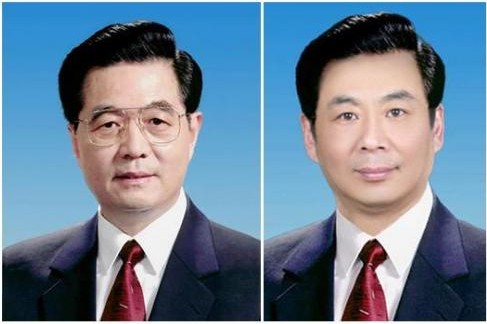The Word of the Week comes from the Grass-Mud Horse Lexicon, a glossary of terms created by Chinese netizens or encountered in online political discussions. These are the words of China’s online “resistance discourse,” used to mock and subvert the official language around censorship and political correctness.
Do you speak for the Party or the people?
Tì Dǎng shuōhuà, háishì tì lǎobǎixìng shuōhuà? 替党说话,还是替老百姓说话?

Netizens discovered that Lu Jun’s photo on the municipal website was actually his face superimposed on Hu Jintao’s head. (Source: EastSouthWestNorth)
Question posed by Zhengzhou official to a reporter investigating municipal malfeasance, believed by netizens to reveal the true nature of the Chinese Communist Party.
In 2009, the government of Zhengzhou, Henan displaced local residents and gave a real estate developer permission to build low-income housing. The developer built two apartment buildings and 12 villas instead, making RMB 100 million on the project—twice as much as they would have if they had built what they had promised.
When a reporter visited the Department of Urban Planning to investigate, departmental Vice Director Lu Jun looked at petition materials prepared by a local resident and asked the reporter, “Do you plan to speak for the Party or for the people?” (你是准备替党说话,还是准备替老百姓说话?). The reporter was baffled, since the interests of the Party and the people are theoretically the same. Lu then claimed he knew nothing of the case and dismissively said that the relevant department would handle it.
Lu’s comment went viral, confirming for many their long-held suspicion that the Party’s interests are actually in conflict with those of the people. Some netizens argued that Lu had actually done a great service by speaking the truth. “There are too few Party bureaucrats willing to speak the truth,” Tianya user Xiaocaoxiaodashu (@小草笑大树) commented. “I applaud him!”
Weibo users recalled Lu Jun’s infamous truth-telling when President Xi Jinping inspected CCTV headquarters in February 2015, emphasizing that state media “must speak for the Party“:
@pupuwaal: Back then, when a certain official asked a reporter whether he spoke for the Party or the people, the public was in an uproar. Now the highest level has decided the answer to this question. (February 20, 2016)
当年某官员质问记者你是替党说话还是替老百姓说话时,舆论还一片哗然,如今顶层给这个问题定出标答了。[Chinese]
Displacement of residents for the profit of the local government and real estate companies are a majorsource of social unrest throughout China.
See also monkey-snake.









